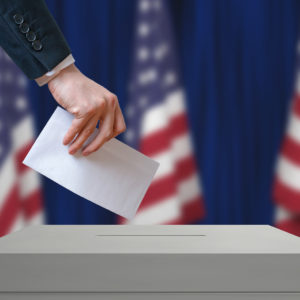This is a historic presidential election. The next president could dramatically change the nature of the U.S. Supreme Court for generations to come. As such, voters who care about the direction of this country must base their vote on the importance of the Supreme Court when they cast their ballot this November.
Being a “Supreme Court voter” is different from being a single-issue voter. So many issues that matter to Americans — immigration reform, healthcare, voting rights, reproductive rights, campaign finance reform and core constitutional questions about how we define rights and government power — end up at the Supreme Court.
Yet because of Senate obstructionism, one seat on the Supreme Court has remained vacant since February, leaving only eight justices to decide on many of our nation’s most pressing issues.
We have already seen the harmful effects of Senate obstructionism on the Supreme Court. This past Supreme Court term, an eight-justice court deadlocked on the legality of the president’s executive actions on immigration, leaving more than 6 million citizens fearing the loss of a loved one to deportation. An eight-justice Supreme Court couldn’t decide what to do about an employee’s right to birth control under the Affordable Care Act, leaving hundreds of thousands of women employed at religious organizations unsure of the status of their healthcare coverage. An eight-justice Supreme Court also split on whether public unions can continue to fund themselves in a way that had been upheld by Supreme Court precedent for 40 years, leaving the long-term health and vitality of public-sector unions in limbo.
The blame can and should be placed at the feet of obstructionist senators who would rather leave the Supreme Court seat open for a justice appointed by the unpredictable Donald Trump than consider President Obama’s Supreme Court nominee, Chief Judge Merrick Garland, one of the most experienced jurists ever nominated to the Supreme Court. The Senate has shirked its constitutional duty to consider Judge Garland for more than 170 days — longer than any president’s Supreme Court nominee has ever had to wait for an up-or-down vote.
Meanwhile, with nearly 90 empty federal judicial seats across the country, the Senate has all but ignored the numerous nominees waiting for a vote on the Senate floor. The Senate’s pattern of obstruction has created unprecedented backlogs in the courts and has damaged the Supreme Court’s ability to decide key issues.
The American people are watching. A poll conducted by the Center for American Progress found that an overwhelming majority of voters — 70 percent — believe that Senate leaders like Chuck Grassley and Mitch McConnell are blocking Judge Garland’s nomination for political reasons. Voters reject this unprecedented and irresponsible obstruction, and they will hold their obstructionist senators accountable in November.
Garland’s nomination is only the current battle, but in the next president’s first term, three justices will surpass the age of 80. Supreme Court justices serve life tenures, and the opportunity to appoint a justice — let alone potentially three — solidifies and continues a president’s legacy for generations. The next president could nominate justices who adhere to the constitutional principles of justice and equality for all, or the next president could nominate justices who would erode civil rights and the rights of women, workers and immigrants, while promoting archaic constitutional principles and prioritizing corporate interests.
The next president’s ability to appoint ideologically driven justices that could swing the court backward is not an abstract threat. Earlier this summer, the 4th Circuit Court of Appeals struck down North Carolina’s voter suppression law, finding that it specifically “targets African-Americans with almost surgical precision.” The North Carolina governor appealed to the Supreme Court to reinstate the law. The justices split 4-4 on the appeal just last week, ensuring — by mere default — that elections in North Carolina can go forward this fall without the “cloud and concern of racially discriminatory laws.” The appointment of just one justice who rejects anti-discrimination efforts for ideological purposes could significantly undermine voting rights and civil rights for millions of Americans and their progeny.
It is clearer now than ever: even one seat on the Supreme Court can make all the difference.
There are many issues at stake in this election. What happens with those issues often depends on who is sitting on the Supreme Court. This November, we all need to be Supreme Court voters.

